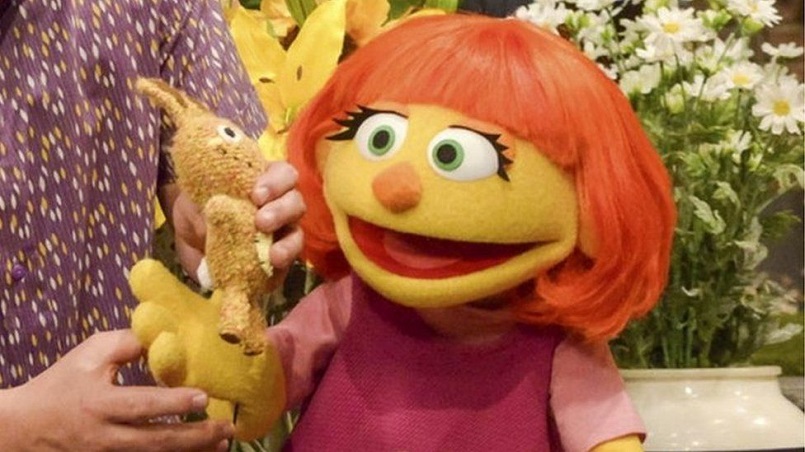
Sesame Street has introduced its latest muppet - a little girl called Julia, who has autism.Sesame Street has introduced its latest muppet - a little girl called Julia, who has autism.
The character's already featured in digital and printed storybooks, but will debut on TV next month.
Her introduction will attempt to explain the complex topic of autism to a young audience.
But this isn't the first time Sesame Street has been a trailblazer in introducing socially progressive characters to children.
Look back at some of the other characters who've attempted to explain difficult issues to children.
Kami, the HIV-positive character
Kami was introduced to the South African version of Sesame Street in 2002.
She was brought in to try to reduce the stigma around people with HIV/Aids in a country with one of the highest infection rates in the world.
Her name comes from the word kamogelo, which means acceptance in the Zulu, Sesotho and Setswana languages.
The designer of the muppet Ed Christie said in 2004 that Kami was deliberately designed not to be a "humanoid" character, as the makers felt that she would be easier to accept.
Mahboub, the Arab-Israeli muppet
In 2006, Sesame Street introduced a character to try to reduce prejudice between Israelis and Palestinians.
Mahboub, a five-year-old Arab character, speaks Hebrew and Arabic, and appeared in both Israeli and Palestinian versions of the show - as well as in Shalom Sesame, the Jewish-American version.
In a part of the world where tension between the two territories has been high for decades, his introduction prompted some unhappy reactions.
Yuli Tamir, Israel's minister of education at the time, said the character had the aim of "teaching children how to live together, how to work together with each other despite their differences".
Aristotle the blind monster
Also known as Ari, this muppet appeared in the 1980s to teach children how blind people live in the wider world.
In one scene, he shows Big Bird how he uses Braille by reading Little Red Riding Hood.
Most Sesame Street characters don't have visible ears - but Aristotle was a rare exception, to help explain how he uses other senses instead of sight.
Katie the wheelchair user
When a series was made specially for Canadian viewers began in 1987, it featured wheelchair user Katie as one of its main characters.
She often called herself "Super Katie" to show how being a wheelchair user didn't stop her being an active part of society.
However, Katie's stint on the screen ended when Sesame Park, also simply known as "Canadian Sesame Street," was cancelled in 2001.
Big Bird and bullying
A 2011 episode taught children how to recognise and tackle bullying at school.
The story revolves around Big Bird, who, because of his size and colour, isn't allowed in the "good birds' club" by its leader Pigeon.
Big Bird even appeared on CNN around the time of the episode as part of a wider anti-bullying campaign.
This wasn't the first time Sesame Street took on this subject. In 2003, they performed a blues song Don't be a Bully.
Lily, the muppet highlighting childhood hunger
In 2011, Sesame Street released a one-hour special on childhood hunger in the US.
This episode wasn't just for kids - it was aired in the evening and also targeted adults.
It features a girl called Lily, who is described as "food insecure" - she's given free school meals due to her low-income family.
In the episode, she talks about how her family goes to food banks, and tells Elmo: "What I would do is just drink some water from the fountain, until my stomach's full of water."
'Gay' characters Bert and Ernie (unofficially)
For decades, audiences have believed that best friends Bert and Ernie are actually lovers - an especially progressive move for a show which started in 1969.
The two do have a very close relationship, and sleep in the same room - and their images have been used in gay rights' protests for years, for example on the cover of the New Yorker after same-sex marriage was legalised in the US in 2013.
In 2014, a Christian-run bakery in Northern Ireland refused a customer's request to make a cake with the faces of Bert and Ernie with a pro-gay rights message.
But Sesame Street has always denied that the two are gay, including in a Facebook statement in 2011, where they said that the two muppets "were created to teach preschoolers that people can be good friends with those who are very different from themselves".
Or, as Sesame Street Workshop boss Gary Knell put it in 1994, "they are not gay, they are not straight, they are puppets. They don't exist below the waist".
